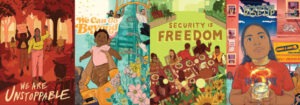
December 19, 2018; CNN
NPQ has spent a good deal of time lately talking about public narratives and how we use them and connect our work to them in the sector. But the work of understanding what the public is thinking about can also be traced through words. Long story short, the frequency with which the word “justice” was looked up online on Merriam-Webster’s dictionary site climbed 74 percent in 2018 over the previous year.
“The concept of justice was at the center of many of our national debates in the past year: racial justice, social justice, criminal justice, economic justice,” Merriam-Webster writes. “In any conversation about these topics, the question of just what exactly we mean when we use the term justice is relevant, and part of the discussion…justice has varied meanings that do a lot of work in the language—meanings that range from the technical and legal to the lofty and philosophical. For many reasons and for many meanings, one thing’s for sure: justice has been on the minds of many people in 2018.”
Writing for the Washington Post, Peter Sokolowski, editor at large for Merriam-Webster, says the word was a constant focus during the year.
What we saw with justice in 2018 was more like a continuous sequence of bumps in the data rather than a single outstanding spike; the word rose to the point of being just below the very top words of any given day, but remained there almost every single day, accounting for such a large increase in lookups. Rather than being driven by a single event, interest in this word correlates to many events in the news, including stories touching on racial justice, social justice, criminal justice, obstruction of justice, countless stories involving the Justice Department, and the specific use of justice as a synonym and title for a judge.
Sign up for our free newsletters
Subscribe to NPQ's newsletters to have our top stories delivered directly to your inbox.
By signing up, you agree to our privacy policy and terms of use, and to receive messages from NPQ and our partners.
When asked why the word may have been so intriguing, Sokolowski said, in an interview with The Times of India:
We’re good at reading data; we’re not good at reading minds. The data shows that justice has been on our minds, and many events and stories connect to it. It (the word) certainly reflects a curiosity about this idea of a system of fairness. “Justice” came to English from French after the Norman Conquest, when the Normans imposed their legal system on the people of Britain. Old English had words like law, fair, and right, but nothing that denoted a bureaucracy or system of fairness, correctness, and righteousness like “justice”…the words we use tell us about what is on our minds. It is a map of our priorities and interests.
Given all that, NPQ likes this word much more than Oxford Dictionaries’ choice of “toxic” as its word of the year, and Dictionary.com’s declaration of “misinformation” as its depressing winner.
In 2017, the big Merriam-Webster winner was “feminism.”
Among 10 words that saw jumps in interest in 2018 were “nationalism,” “pansexual,” “lodestar,” “feckless,” and “respect.” We will leave you to connect these to the appropriate news stories that may have caused them to spike. “Justice,” on the other hand, did not spike so much as maintain a constantly higher place in our consciousness, and we may wish to understand that as an opportunity.—Ruth McCambridge













